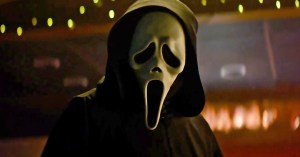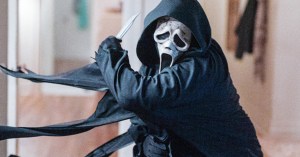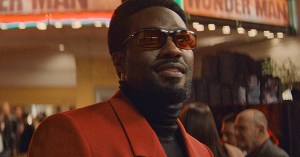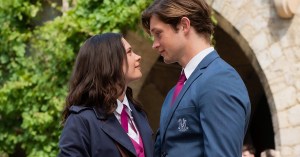Jon Voight’s Best Movies
In this week's Total Recall, we count down the best-reviewed work of the Getaway star.
Jon Voight‘s latest movie, this weekend’s Ethan Hawke/Selena Gomez thriller Getaway, has been consigned to late August oblivion — but well before he spent summer’s dog days playing an oddly accented kidnapper, Voight earned a reputation for being one of Hollywood’s more talented and hard-working actors, with an eye for scripts that would challenge the audience as well as himself. Naturally, we decided to devote this week’s list to an appreciation of his best-reviewed works, so without further ado…everybody’s talkin’ Total Recall, Jon Voight style!
10. Coming Home
Part political statement, part slowly unfolding love triangle, Hal Ashby’s Coming Home paid tribute to the nation’s Vietnam vets with an often heart-wrenching drama about a VA hospital volunteer (Jane Fonda) who finds herself drawn to a paraplegic ex-GI (Voight) while her husband (Bruce Dern) is overseas fighting in the war. Both Voight and Fonda won Oscars for their work in the film, and while some critics complained about Ashby’s occasional allowance for melodrama, for others, the complicated relationship between the stars’ characters more than compensated for any flaws. “Thinking about the movie,” reflected Roger Ebert, “we realize that men and women have been so polarized in so many films, have been made into so many varieties of sexual antagonists or lovers or rivals or other couples, that the mutual human friendship of these two characters comes as something of a revelation.”
9. The General
Voight reunited with Deliverance director John Boorman for 1998’s The General, starring Brendan Gleeson as notorious Irish crime boss Martin Cahill, whose life of ruthless crime — and eventual assassination — serve as the grist for a grimly compelling black-and-white drama whose stark verisimilitude was no doubt aided by the fact that Boorman himself was once a victim of Cahill’s string of burglaries. A Cannes favorite, The General wasn’t much of a box office draw in the States, in spite of Boorman’s pedigree and a cast that included Voight as a police inspector with a link to Cahill — not to mention reviews from critics like Time Out’s Geoff Andrew, who observed, “All the performances are impressive, but Gleeson and Voight are especially memorable, lending an almost tragic air of inexorability to Cahill and Kenny’s cat-and-mouse games.”
8. The Manchurian Candidate
It takes some serious chutzpah to remake a movie as well-received as The Manchurian Candidate, but director Jonathan Demme was no rookie by the time he got around to putting together his own adaptation of the Richard Condon novel in 2004 — and he was aided and abetted by a terrific cast that included Denzel Washington as war hero Ben Marco, Meryl Streep as a senator who’s pushing her son (Liev Schreiber) — who was also one of Marco’s officers — into a political career, and Voight as a potential vice-presidential candidate whose ambitions make him an obstacle to her plans. Manchurian‘s 1962 film adaptation proved an eerily timely political thriller, and the passage of time (as well as a handful of storyline changes) did nothing to dull its edge; as David Edelstein wrote for Slate, “Beautifully made and unsurpassingly creepy, it’s the rare remake with something contemporary to add.”
7. The Rainmaker
The idea of a director as accomplished as Francis Ford Coppola bringing his talent to bear on an adaptation of a John Grisham novel might seem offensive to some cineastes, but at least in the case of 1997’s The Rainmaker, it proved a match made in critical heaven. Matt Damon stars here as Rudy Baylor, a young and (at least temporarily) naive law school grad who ends up filing a lawsuit against a shady insurance company, and he’s in very good company, surrounded by a supporting cast that includes Voight (as the slimy opposing counsel), Danny DeVito, Roy Scheider, Mickey Rourke, and Claire Danes. Critics might have gone in expecting something that would live down to Grisham’s lowbrow reputation, but they came away pleasantly surprised — as Madeleine Williams of Cinematter observed, “With numerous entertaining subplots, plenty of well thought-out characters, brought to life by talented actors, and an invigorating trial, what more do you want from a Grisham film?”
6. Rosewood
Director John Singleton snapped a critical dry spell with 1997’s Rosewood, a harrowing dramatization of 1923’s shameful Rosewood massacre, during which the residents of a primarily black Florida town were attacked by whites from a neighboring city, setting off days of horrific racial violence that culminated in Rosewood’s total abandonment. It’s the kind of episode any country would rather forget — and forget it most Americans did, for decades. Rosewood capped a 15-year period when the tragedy was rediscovered, first by journalists, then finally by the politicians who authorized reparations for its survivors. Starring Don Cheadle as a kind-hearted music teacher, Ving Rhames as a stranger whose arrival galvanizes white fear, and Voight as one of Rosewood’s few white residents, the movie resonated with critics like Jose Martinez of Boxoffice Magazine, who wrote, “Comparisons to today’s society can’t help but be made while watching Rosewood; although moviegoers might wish to leave the theatre thinking we are living in a better time, they might not be able to.”
5. Runaway Train
What do you get when you take a train in the Alaskan wilderness, put an insane Jon Voight on it, give him Eric Roberts for a sidekick, and throw in a little Danny Trejo for good measure? The answer lies in this ’80s action classic about a violent lunatic (Voight) who escapes from prison with the help of a dimwitted convict (Roberts) and ends up stowing away on a train that just happens to be on a collision course…with DEATH! Ahem. The cast and the premise suggest cheesy B-movie thrills, but Runaway Train boasts a surprisingly impressive pedigree — the script was based on a Kurosawa screenplay, and director Andrei Konchalovsky was still years away from succumbing to the nonsense of Tango & Cash. As Geoff Andrew wrote for Time Out, “Somehow one leaves aside the blatant implausibilities, the coincidences, even Eric Roberts, and takes great pleasure in a breakneck ride to the end of the line.”
4. Heat
It’s kind of a bit part, but we’d be remiss if we left Voight’s appearance in Michael Mann’s Heat off this list — if for no other reason than that his presence among this impeccably assembled cast of marquee titans and sterling character actors (including Al Pacino, Robert De Niro, Danny Trejo, William Fichtner, Hank Azaria, and a young Natalie Portman) indicates the dependability (and stature) he’d acquired by the 1990s. Although he certainly filmed his share of duds during the decade (he appeared in Anaconda two years later), Heat proved he was still capable of spotting a good script. As Kenneth Turan observed for the Los Angeles Times, “Michael Mann and a superlative cast have taken a classic heist movie rife with familiar genre elements and turned it into a sleek, accomplished piece of work, meticulously controlled and completely involving.”
3. Catch-22
The blackest of pitch-black war comedies, Mike Nichols’ Catch-22 arrived during the thick of the Vietnam War, adapting the classic Joseph Heller novel about the absurdity of war into an acidic argument against armed conflict that — despite its World War II setting — underscored the futility of the country’s overseas imbroglio. Although it suffered no small measure of Vietnam blowback with audiences — who turned out for MASH and Patton the same year — it resonated strongly with critics, thanks in part to an impressive cast that included Orson Welles, Alan Arkin, Martin Sheen, Charles Grodin, and (of course) Jon Voight. The end result was, wrote the New York Times’ Vincent Canby, “Quite simply, the best American film I’ve seen this year.”
2. Midnight Cowboy
Voight has spent a substantial portion of his career (especially of late) playing deliciously nasty bad guys, but as the Best Picture-winning Midnight Cowboy proves, he’s also capable of conveying characters from the opposite extreme. As the haunted and heartbreakingly naive Joe Buck, Voight filled up every bit of the screen not occupied by Dustin Hoffman’s fast-talking Ratso Rizzo — no mean feat — and offered a ray of hope among the movie’s clouds of misanthropy. “What has happened to Midnight Cowboy,” reflected Roger Ebert, “is that we’ve done our own editing job on it. We’ve forgotten the excesses and the detours, and remembered the purity of the central characters and the Voight and Hoffman performances.”
1. Deliverance
The movie that forever changed the popular concept of a purty mouth, Deliverance depicted the American South as an inbred horror show populated by banjo-plucking troglodytes and sodomizing hillbillies — and yet it somehow managed to pick up three Academy Award nominations (including Best Picture and Best Director) and accrue heaps of critical acclaim. What elevates Deliverance from others of its ilk — aside from director John Boorman’s agonizingly taut work — are the efforts of a terrific cast. Playing four city-dwelling friends on what’s supposed to be a fun weekend in the wilderness, Voight, Burt Reynolds, Ronny Cox, and Ned Beatty imbued their characters’ grueling ordeal with poignant humanity. “It doesn’t all hold together,” admitted Luke Y. Thompson for New Times, “but when it does, it scares you into never ever wanting to vacation down South.”
In case you were wondering, here are Voight’s top 10 movies according RT users’ scores:
1. Heat — 91%
2. Midnight Cowboy — 86%
3. The Champ — 82%
4. Rosewood — 81%
5. The General — 81%
6. Glory Road — 80%
7. Deliverance — 79%
8. Coming Home — 79%
9. National Treasure — 75%
10. Enemy of the State — 75%
Take a look through Voight’s complete filmography, as well as the rest of our Total Recall archives. And don’t forget to check out the reviews for Getaway.
Finally, here’s proof that Voight really sinks his teeth into a role, no matter how small:










